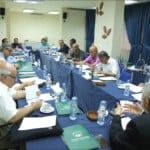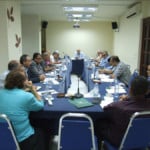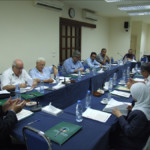On Thursday, 27/7/2017, a distinguished group of researchers and experts on Palestinian, Arab, and international affairs discussed “The Impact of the Gulf Crisis on the Palestinian Issue,” in a panel discussion held by Al-Zaytouna Centre for Studies and Consultations in its headquarters in Beirut.
The panel, which was moderated by Al-Zaytouna General-Manager Dr. Mohsen Mohammed Saleh, overviewed the background, developments, and repercussions of the Gulf crisis in the immediate Gulf region and on the Palestinian issue.
At the start of the session, Wael Saad made a power-point presentation outlining the timeline of the crisis, the backdrop of the recent escalation, and the possible implications for the Palestinian issue.
In the first session, the participants presented their analyses of the crisis, while the second session focused on the possible future scenarios of the crisis and implications for the Palestinian issue.
The participants were in agreement that while the Gulf crisis may have averted a full conflagration, the ongoing escalation despite it being relatively under control may carry future risks for the Gulf landscape and the cohesion of the Gulf Cooperation Council. In addition, it may produce dangerous side-effects in the Arab region in general and the Palestinian issue in particular.
The panelists warned that Israel may gain from the fragmentation experienced by the Arab bloc and the inter-Arab hostilities, by seeking covert and overt normalized ties with some Arab countries. They also cautioned that Israel may take advantage of these circumstances to push its settlement agenda, and tighten the siege on the Palestinians in the West Bank and Gaza Strip, amid an impasse in the failing peace process. Israel may capitalize on the distraction of the Arab states and peoples with secondary conflicts, to implement its plan to terminate the Palestinian issue on its terms.
The panelists also warned Palestinian factions against joining any camps, which would exacerbate the divisions of the Palestinian people and weaken the Palestinian issue.
Instead, they called on Palestinian factions to pursue an inclusive national strategy in isolation from inter-Arab polarizations, focusing on the confrontation with the Israeli occupation.
At the end of the panel, the participants made recommendations, urging the crystallization of a Palestinian project based on ending the occupation, rather than managing the Palestinians under occupation.
Al-Zaytouna Centre for Studies and Consultations, 7/8/2017







Leave A Comment